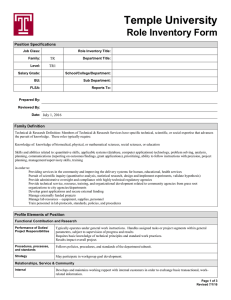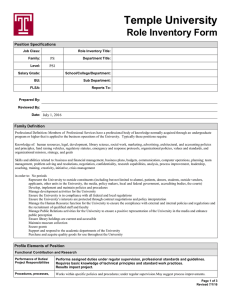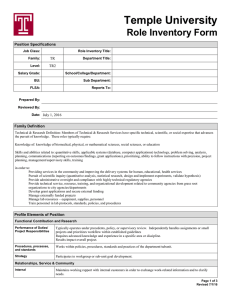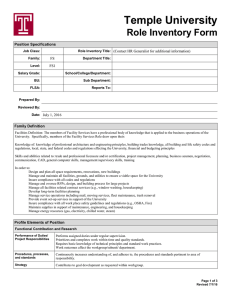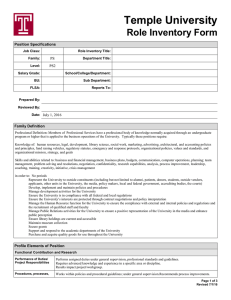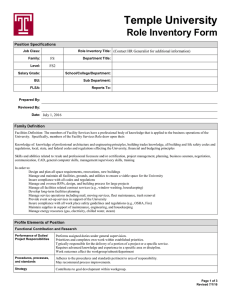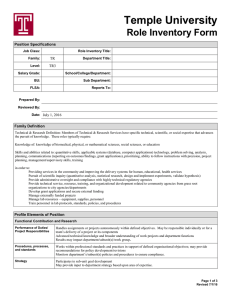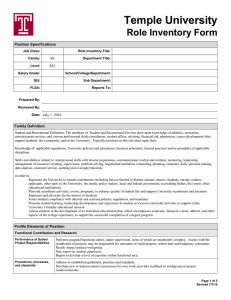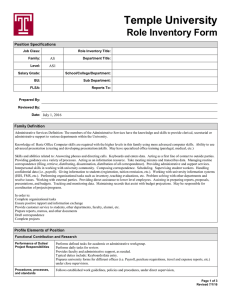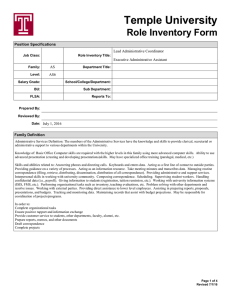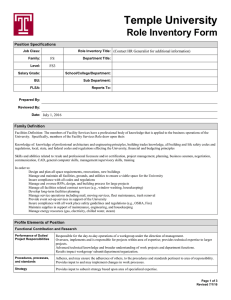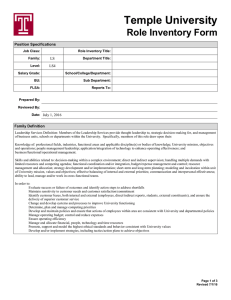TR1 Role Inventory
advertisement
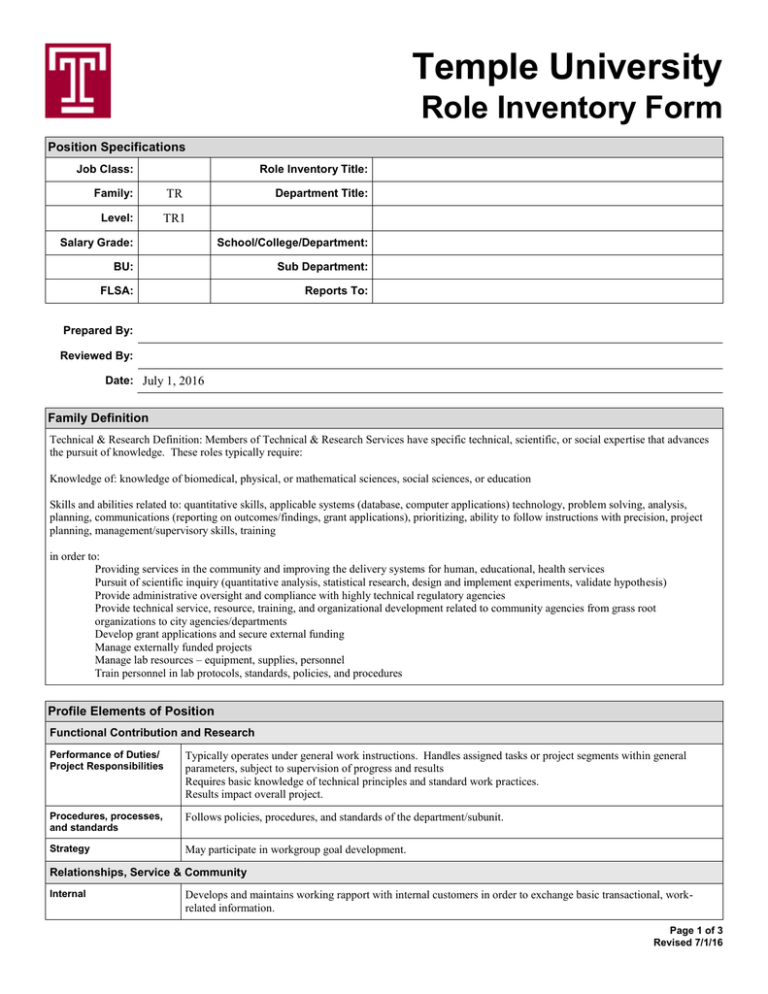
Temple University Role Inventory Form Position Specifications Job Class: Role Inventory Title: Family: TR Department Title: Level: TR1 Salary Grade: School/College/Department: BU: Sub Department: FLSA: Reports To: Prepared By: Reviewed By: Date: July 1, 2016 Family Definition Technical & Research Definition: Members of Technical & Research Services have specific technical, scientific, or social expertise that advances the pursuit of knowledge. These roles typically require: Knowledge of: knowledge of biomedical, physical, or mathematical sciences, social sciences, or education Skills and abilities related to: quantitative skills, applicable systems (database, computer applications) technology, problem solving, analysis, planning, communications (reporting on outcomes/findings, grant applications), prioritizing, ability to follow instructions with precision, project planning, management/supervisory skills, training in order to: Providing services in the community and improving the delivery systems for human, educational, health services Pursuit of scientific inquiry (quantitative analysis, statistical research, design and implement experiments, validate hypothesis) Provide administrative oversight and compliance with highly technical regulatory agencies Provide technical service, resource, training, and organizational development related to community agencies from grass root organizations to city agencies/departments Develop grant applications and secure external funding Manage externally funded projects Manage lab resources – equipment, supplies, personnel Train personnel in lab protocols, standards, policies, and procedures Profile Elements of Position Functional Contribution and Research Performance of Duties/ Project Responsibilities Typically operates under general work instructions. Handles assigned tasks or project segments within general parameters, subject to supervision of progress and results Requires basic knowledge of technical principles and standard work practices. Results impact overall project. Procedures, processes, and standards Follows policies, procedures, and standards of the department/subunit. Strategy May participate in workgroup goal development. Relationships, Service & Community Internal Develops and maintains working rapport with internal customers in order to exchange basic transactional, workrelated information. Page 1 of 3 Revised 7/1/16 Temple University Role Inventory Form Profile Elements of Position External Develops working rapport with external customers in order to exchange basic transactional, work-related information. Functional Team Members Develops and maintains working relationships in order to receive and provide routine information necessary to complete work. Problem Solving & Innovation Scope of Issues Deals with recurring conditions or operating procedures that impact the workgroup Refers issues outside of established procedures to higher levels. Problem Resolution/ Resources Available Resolves problems within standard policies and procedures; consults with others for confirmation/ approval/support Relies on readily available assistance of supervisors and other experts within the workgroup. Creativity and Innovation May suggest creative and innovative methods for work processes or problem resolution. Decision Making Impact Context of Decisions Makes decisions within defined rules/instruction; decisions impact workgroup. Financial No budget responsibility. People May give input into HR related issues of undergraduate students. Leadership and Training Professional Development May demonstrate work processes to undergraduate student employees. and Training Technical Leadership May contribute specific technical expertise to individuals, the workgroup or project. Team Morale/ Role Model Adheres to professional standards. Key Departmental Functions (capsule statement and basic task list from dept and prior version descriptions) Profiling Related Dimensions A. Supervision: Does not supervise other employees; may provide direction to student workers. B. Operating Budget range, if Applicable: C. Typical Education & Experience: Bachelor’s Degree and 1 to 2 years of directly related experience. An equivalent combination of education and experience may be considered. D. Typical Equipment Used: Ability to work in an environment exposed to fumes or airborne particles. E. Environmental Conditions: Ability to work in an environment exposed to toxic or caustic chemicals. Ability to work in a wet or humid environment. Ability to distinguish colors. F. Expected Physical Requirements: Ability to speak clearly. Page 2 of 3 Revised 7/1/16 Temple University Role Inventory Form Profiling Related Dimensions Ability to see clearly with corrective lens. Ability to use hands to fingers, handle, or feel. Ability to reach with hands and arms. Ability to work a computer for an extended period of time. Ability to manipulate and assemble files. Ability to operate standard office equipment. Ability to work nights/weekends/early mornings. Ability to work overtime. Ability to operate laboratory equipment. Ability to handle sensitive equipment. Ability to operate specialized heavy/laboratory/scientific equipment. G. Other Pertinent Dimensions: Note: This description incorporates the most typical duties performed. It is recognized that other related duties not specifically mentioned may also be performed. The inclusion of these duties would not alter the overall evaluation of this position. University Compensation (JobClass Title Family Level) Page 3 of 3 Revised 7/1/16
